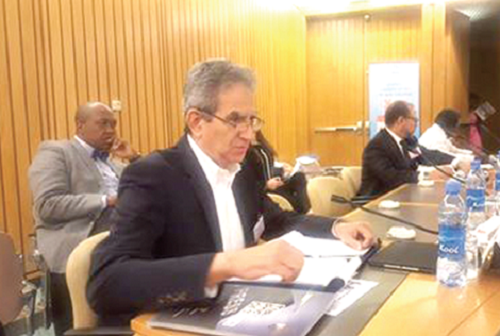
Use available resources to achieve results - Journalists challenged
The Chief Executive Officer (CEO) of the African Media Initiative, Mr Eric Chinje, has advised African journalists to stop giving the excuse of lack of funds for not covering critical issues in their own countries and other African countries.
Advertisement
He said that excuse was not tenable, since “whatever situation we find ourselves, we must use the resources available” to achieve the needed results.
Mr Chinje gave an example that “ Journalists could use technology, phones, Whatsapp and networking to research and source information on Africa “, in order to report on Africa to Africans.
“There are many things and ways we could explore to report on Africa to Africa and the world,” he said.
Speaking at the just ended two-day African Senior Media Dialogue held in Addis Ababa, Ethiopia, Mr Chinje said African journalists must change the stereotypical narratives culled from foreign media and presented to Africans by writing stories through their own lenses and bringing the African perspective to their stories.
The dialogue was held on the theme: “The role of media in Africa’s development, women’s empowerment and its support to the Agenda 2063”.
It is a follow-up to the Vaal consensus reached at the Regional Media dialogue held in the Vaal, Gauteng in South Africa in February 2009 where deliberations were centred on how the role of the media could be strengthened for the implementation of the New Partnership for Africa’s Development (NEPAD) and the Maseru Declaration reached after the second Africa Regional Dialogue meeting in Maseru, Lesotho, in June 2011, to discuss the role of the media in Africa’s development.
Mr Chinje said the dialogue was taking place at a time when “Africa and the world are unwell, not in good health and with threatening spirit”.

Dr Moustefa Souag, acting Director of Al Jazeera Media Network
The CEO explained that the year 2000 ushered in an African renaissance but it seemed “ we are back to the same images of poverty, disease, war etc. and Africans need to reframe the narrative and also pay attention to the critical role of women in Africa’s development.
Mr Chinje, however, noted that it was still very important that the African media was equipped intellectually and with the necessary facilities and infrastructure to help carry out their duties more effectively and efficiently.
On the safety and protection of journalists, the acting Director of Al Jazeera Media Network, Dr Moustefa Souag, described as unacceptable the increasing killing of journalists in the course of their duties and putting impediments in their way.
He said it was very necessary for journalists to speak and act against such acts with one voice especially because “today it is one journalist, tomorrow it may be you”.
Dr Souag cited for instance a situation in Egypt where journalists betrayed other journalists and were imprisoned but today those journalists who did that were also facing the same situation only because it is a line of duty of gathering and disseminating information.
He said it was not just enough for journalists to speak against such acts but to also be trained to protect themselves and take the necessary precaution.
Dr Souag said journalists should be educated by their media on places considered danger spots so that they would know how to conduct themselves while at post there.
He suggested that media houses should provide security for their journalists when necessary and should refrain from assigning journalists who are reluctant to go on such assignments because of the danger involved, since experience had shown that such journalists often got into trouble.




